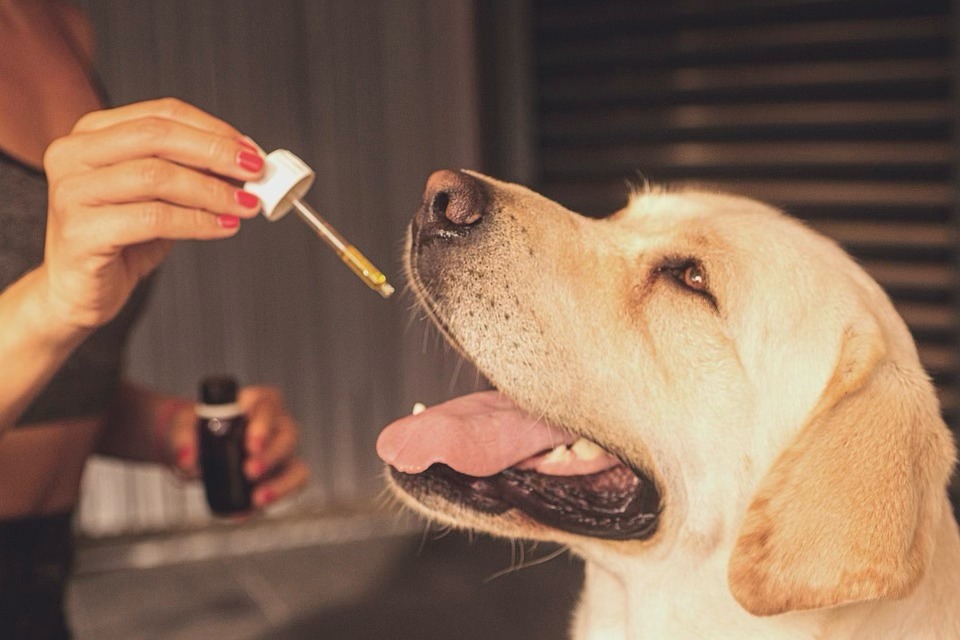Pets can feel anxious just like we do, but natural remedies offer gentle ways to help them relax.
Choosing the right option depends on things like your pet’s unique needs, size, and triggers. By understanding their behavior and using safe, effective treatments, you can ease their stress while keeping them happy and healthy.
Different Types of Natural Remedies for Pet Anxiety
Natural remedies can be a gentle way to ease your pet’s anxiety. They are particularly helpful when tailored to the specific needs of your animal companion.
Below, we explore five effective options.
CBD Oil
CBD oil is becoming increasingly popular among pet owners. It offers calming effects without harmful side effects when properly dosed.
For instance, CBD oil for dogs can help your furry friend to relax – while also maintaining a healthy immune system or relieving occasional joint stiffness.
Chamomile Tea
Chamomile tea can work wonders for dogs and small furry pets like rabbits who are prone to stress during thunderstorms or car rides.
Serve it cooled, in small doses, as part of their regular hydration.
Lavender Essential Oil
Lavender’s scent is well-known for promoting relaxation in humans – and it can work similarly for anxious dogs too!
Use sparingly in diffusers but avoid using around cats due to their unique sensitivities.
Calming Chews
These tasty treats contain natural herbs like valerian root and L-theanine.
They are perfectly designed for soothing both cats and dogs before stressful events like vet visits.
Bach Flower Remedies
Rescue Remedy’s specialized pet formula offers flower-based tinctures that reduce fear across most animals – including birds!
Just add drops into water bowls as instructed on the packaging labels.
These methods highlight how simple remedies can bring big relief naturally while fostering overall healthier lifestyles.
Consider Your Pet’s Specific Needs Before Selecting a Remedy
Every pet experiences anxiety differently. Understanding their specific triggers and behaviors will help you choose the most effective natural remedy.
For example, your dog may fear thunderstorms – and therefore benefit from calming chews – while a cat stressed by changes in routine may need a gentler approach like flower remedies.
When assessing your pet’s needs:
- Identify the cause of anxiety (such as separation or loud noises).
- Observe physical signs like trembling, hiding, or excessive barking.
- Factor in age and health conditions that could influence treatment options.
By addressing these factors first, you can tailor remedies to suit your pet’s unique situation while ensuring safety and effectiveness for lasting results.
Choose Remedies That Match Your Pet’s Size and Species
Not all natural remedies are suitable for every type of pet. A remedy effective for a large dog may not work the same way for a smaller animal, like a guinea pig or bird. Additionally, some species have specific sensitivities to certain substances that must be considered.
For example, lavender essential oil is calming for dogs when diffused but can be toxic to cats due to their unique liver metabolism.
Selecting species-appropriate options ensures your furry or feathered friend receives relief without risking unintended side effects from incompatible treatments.
Start With Mild Remedies to Monitor Reactions Carefully
When introducing a natural remedy, beginning with milder options is the safest approach. Pets can respond unpredictably, even to ingredients considered safe.
A mild choice like Bach flower remedies or calming chews allows you to observe their reaction without overwhelming their system.
Introduce one remedy at a time, giving your pet several days to adjust before adding another treatment if necessary.
Watch for any changes in behavior, appetite, or energy levels that might signal discomfort or adverse effects.
Gradual introduction not only minimizes risks but also helps identify what works best for easing anxiety.
Patience ensures your pet experiences relief safely and comfortably as they adapt to new calming solutions.
Consult a Veterinarian for Safe Recommendations
Veterinarians are your best resource when choosing natural remedies. They understand how specific ingredients interact with your pet’s unique physiology, ensuring safety and effectiveness.
Some remedies may seem harmless but could cause issues if combined with medications or existing health conditions.
A vet can guide you on proper dosages tailored to your pet’s size, age, and species.
Consulting a professional eliminates guesswork and gives you peace of mind knowing the remedy supports your pet’s well-being without unnecessary risks.

